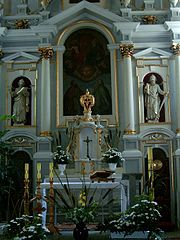
A History Of The Mass And Its Ceremonies In The Eastern And Western Church -Rev John O'Brien A.M.
THE TITLE OF THE BOOK
We have called our book A History of the Mass and its Ceremonies in the Eastern and Western Church. At first sight it seems an easy matter to hit upon such a title as this, but we assure the reader that it did not seem so to us. Many an hour of serious meditation it cost us before we had satisfied ourselves that the designation was a happy one; and all this principally on account of the appellations of Eastern and Western Church. Almost every book that we take in hands—certainly every book of travels—has something to say about the Eastern Church and its liturgical customs; yet we candidly confess that we have never met with one which told us with any degree of satisfaction or clearness what this Eastern Church was, or which did not blunder from beginning to end in attempting to describe its ceremonies. Some are perpetually confounding the Eastern Church with the Greek Church, and the latter with the Russian, wholly forgetting that out of Greece itself no Greek Church exists, and that the Russian Church is no more Greek than it is English or Irish. Others imagine that by the Eastern Church is meant that which is included within the Patriarchate of Constantinople; but this, after all, would be only a fraction of the East, for it would leave out both the Greek Church proper and the Russian Church, each of which is wholly independent of Constantinople and independent the one of the other. We have met some even who have gravely committed it to writing that by the Eastern Church is meant the Syrian and all its branches. Then add to this those never-ending and high-sounding titles that are constantly dinning our ears and seen at the head of almost every review that we take in hand, such as “Holy Orthodox Church,” “Orthodox Imperial Church,” “Orthodox Church of the East,” “Holy Eastern Church,” and so on ad indefinitum; each, no doubt, meaning something, but quite unintelligible without much explanation. The fact is that since the fall of Constantinople, in 1453, there has existed no national church, if we except the Maronite alone, to which the appellation of Eastern could, with strictness, be given; and it is but too well known that the correlative appellation of Western Church went into desuetude centuries before that time. The two designations originally sprang up naturally and necessarily from the division of Constantine’s empire in the fourth century, into that of the East, with Constantinople as its capital, and that of the West, with Rome. Strictly speaking, then, there are no such organizations now as the Eastern and Western Church, and here was our difficulty in choosing a title. “How, then,” somebody will say, “can you justify the name of your book?” The question is answered in this way: If the book were a history, or a geography, or anything of that nature, it could not be justified at all, it would be a misnomer; but inasmuch as it is confined solely to ecclesiastical ceremonies and customs, all of which are the same to-day, with scarcely a perceptible difference, as they were when a real Eastern and Western Church existed, it cannot mislead as to its meaning, nor can it be said of it that it has been unaptly chosen. But it can be justified upon other grounds: Although the Catholic Church recognizes no Church to-day to which she gives the name of Eastern in its original acceptation, still it must not be forgotten that she has at this time several within her communion whose location is wholly in the East, and which yet retain all their ancient ceremonies and customs. The Maronite Church is one of these. It celebrates Mass and the Divine Office in Syriac; administers Holy Communion in both kinds to the laity; has a married clergy, and enjoys the privilege of electing its own patriarch. The Chaldean Church is another: it says Mass in the ancient Syro-Chaldaic; uses leavened bread in the Holy Eucharist; has a married clergy also; and, like all the other churches of the East, is under the immediate jurisdiction of a patriarch. Then there is the Church of the Uniat or Melchite Greeks; it still celebrates in the ancient Greek; like the Maronite and Chaldean, it has a married clergy; like them, also, it administers Holy Communion under both species, and enjoys the singular privilege of reciting the Creed, even in presence of the Pope himself, without being obliged to add the celebrated “Filioque.” These are but a few of the many churches in the East which still retain their ancient ceremonies and customs; but as we shall have frequent occasion to refer to them again in course of the present work, this passing notice must suffice here.

 Support Site Improvements
Support Site Improvements